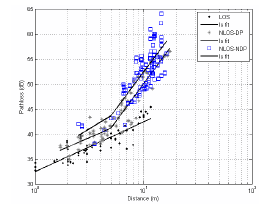TR2009-006
NLOS Channel Identification and Mitigation in Ultra Wideband ToA-Based Wireless Sensor Networks
-
- , "NLOS Channel Identification and Mitigation in Ultra Wideband ToA-based Wireless Sensor Networks", Workshop on Positioning, Navigation and Communication (WPNC), March 2009.BibTeX TR2009-006 PDF
- @inproceedings{Duan2009mar,
- author = {Duan, C. and Alsindi, N. and Zhang, J.},
- title = {{NLOS Channel Identification and Mitigation in Ultra Wideband ToA-based Wireless Sensor Networks}},
- booktitle = {Workshop on Positioning, Navigation and Communication (WPNC)},
- year = 2009,
- month = mar,
- url = {https://www.merl.com/publications/TR2009-006}
- }
- , "NLOS Channel Identification and Mitigation in Ultra Wideband ToA-based Wireless Sensor Networks", Workshop on Positioning, Navigation and Communication (WPNC), March 2009.
-
MERL Contact:
-
Research Area:

Abstract:
Recently, Ultra Wideband (UWB) Time of Arrival(ToA)-based localization in Wireless Sensor Networks (WSNs)have received considerable attention. For a typical WSN operating in indoor environments, the localization performance can be degraded considerably due to the existence of non-line-of-sight (NLOS) channel conditions between the sensor nodes. In these channel conditions the ranging accuracy is degraded due to the attenuation and/or loss of the Direct Path (DP) signal which ultimately imposes a positive bias on the ToA-based distance estimation. As a result there is a need for robust algorithms that have the capability to identify and mitigate those NLOS ranging conditions. In this paper, we propose a novel, low complexity wireless channel condition estimation algorithm that identifies the condition of the channel. Based on the estimated ToA and Received Signal Strength (RSS) the algorithm identifies the channel condition which can be either LOS, NLOS-DP available, or NLOS-DP not available. A channel measurement campaign was conducted in an office environment and the measurement results confirms the validity of our algorithm. To integrate our channel condition estimation into the localization schemes, we propose two weight assignment schemes which generate either a \"soft weight\" or a \"hard weight\". Simulation results show that our estimator has robust performance with success rate of 85%. The simulations also show that by taking advantage of the channel condition estimation, we are able to reduce the RMSE of the localization estimate by over 40%.
Related News & Events
-
NEWS WPNC 2009: publication by Chunjie Duan, Jinyun Zhang and others Date: March 19, 2009
Where: Workshop on Positioning, Navigation and Communication (WPNC)
MERL Contact: Jinyun Zhang
Research Area: CommunicationsBrief- The paper "NLOS Channel Identification and Mitigation in Ultra Wideband ToA-based Wireless Sensor Networks" by Duan, C., Alsindi, N. and Zhang, J. was presented at the Workshop on Positioning, Navigation and Communication (WPNC).
